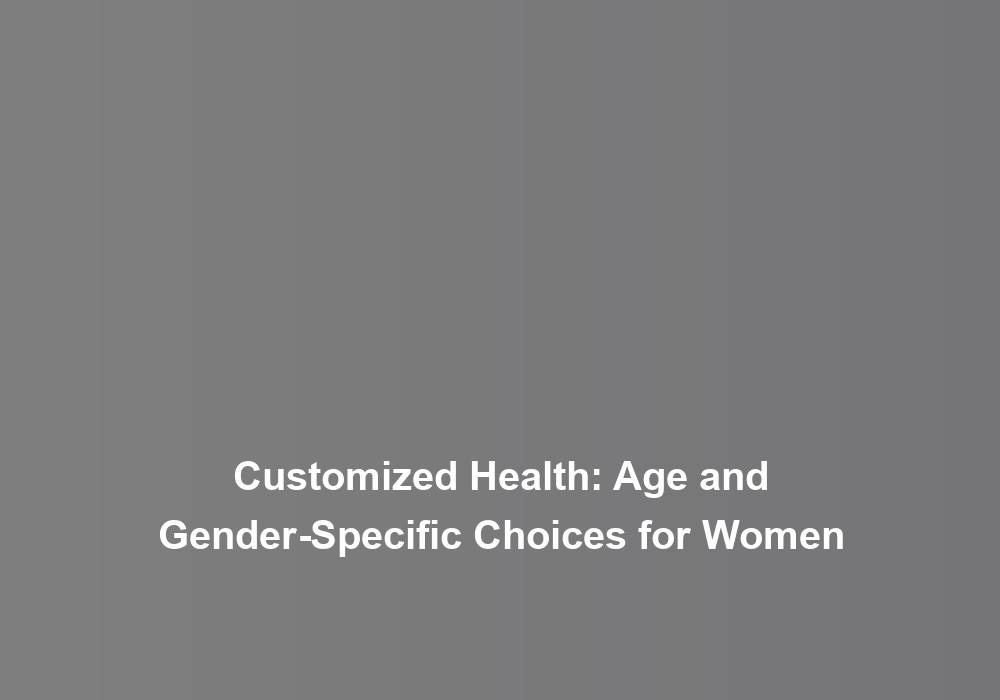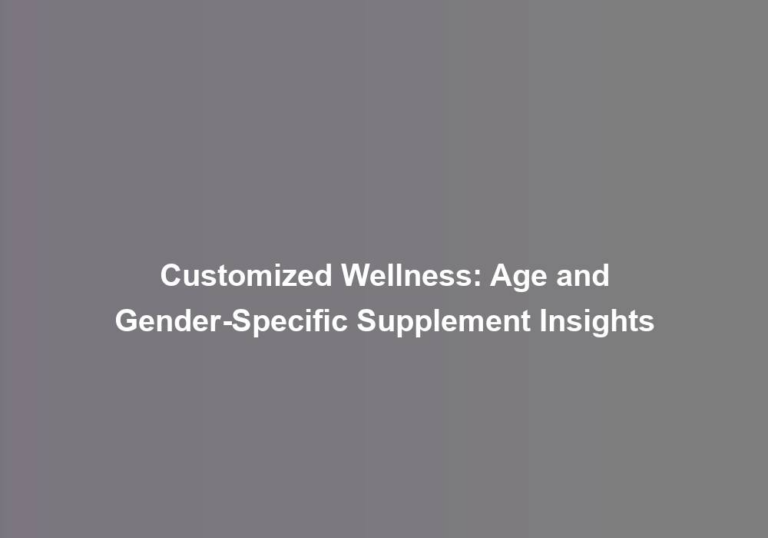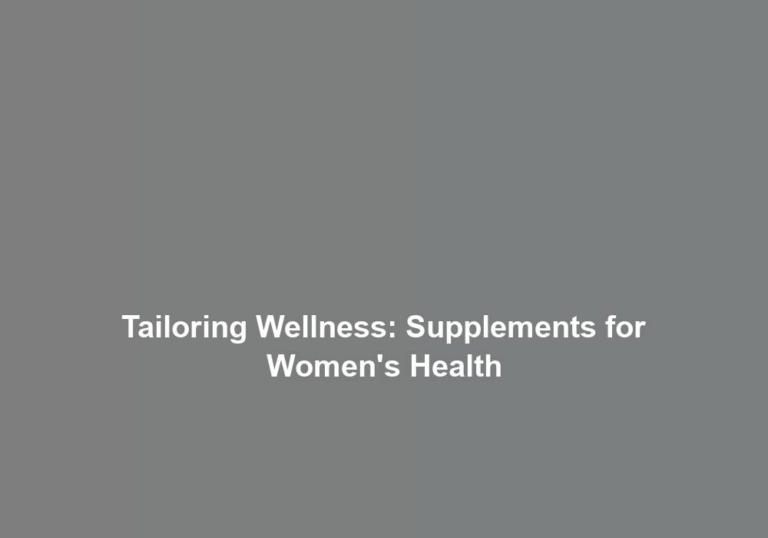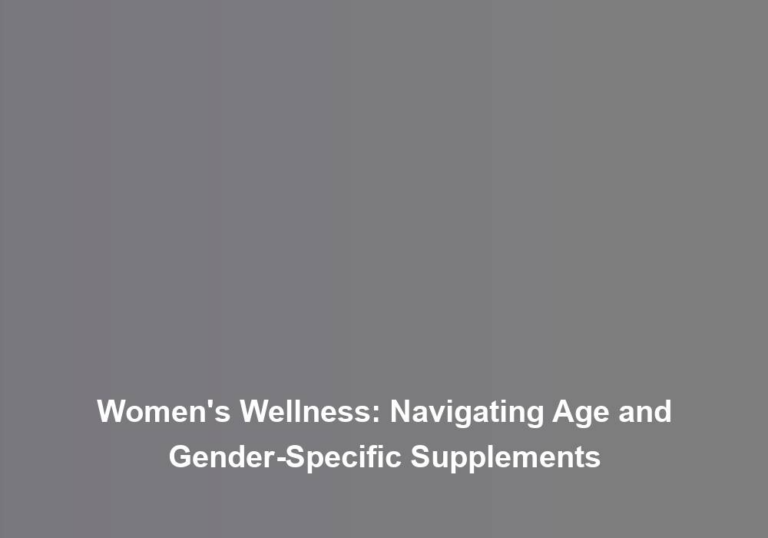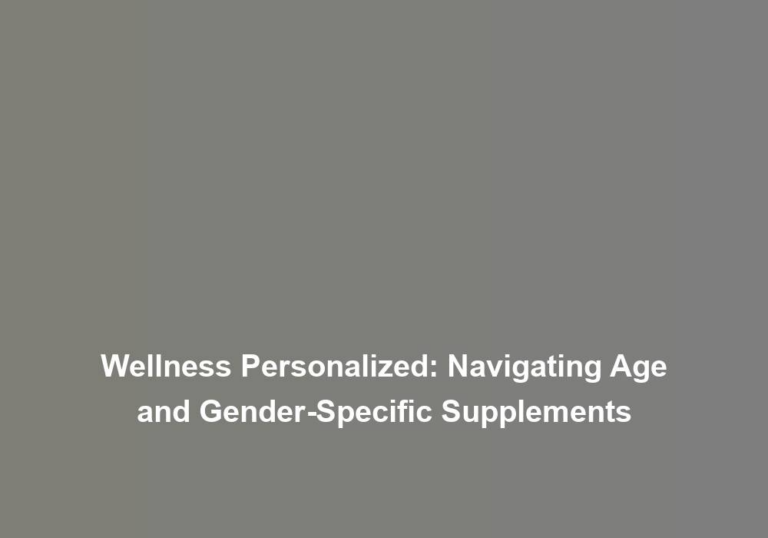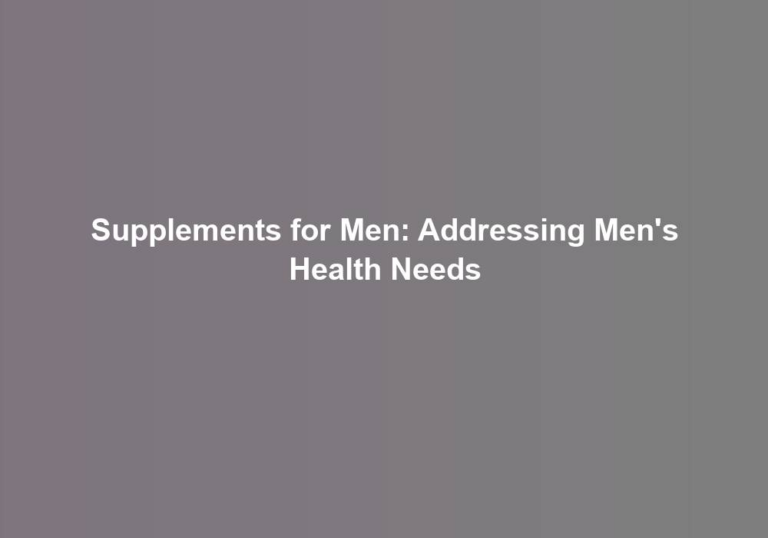Customized Health: Age and Gender-Specific Choices for Women
You may think that healthcare is a one-size-fits-all approach, but when it comes to womenG??s health, age and gender-specific choices play a crucial role in overall well-being. From adolescence to menopause and beyond, the unique needs of women evolve with each stage of life. Understanding how to navigate these changes is essential for maintaining optimal health and quality of life. So, how can you ensure that your healthcare choices are tailored to your specific needs as a woman?
WomenG??s Health in Adolescence
As a teenage girl, you have the opportunity to make important health choices that can positively impact your well-being now and in the future. ItG??s essential to prioritize both your mental health and physical activity during this crucial stage of life. Adolescence can be a challenging time, and taking care of your mental health is just as important as caring for your physical well-being. ItG??s okay to seek help if youG??re feeling overwhelmed or anxious. Surround yourself with supportive friends and family, and remember that itG??s okay to not be okay sometimes. Prioritizing mental health now can set the stage for a healthier future.
Physical activity is also vital during adolescence. Find activities that you enjoy, whether itG??s dancing, playing a sport, or going for a walk. Regular physical activity not only helps keep your body strong and healthy but also has a positive impact on your mental well-being. It can reduce stress, improve your mood, and boost your confidence. Plus, itG??s a great way to make new friends and build a sense of belonging.
Fertility and Reproductive Choices
Navigating the transition from adolescence to adulthood brings about important considerations regarding fertility and reproductive choices, which play a significant role in shaping your future health and well-being. As a woman, you have a unique journey when it comes to fertility preservation and family planning. ItG??s important to be informed about the options available to you in order to make the best decisions for your reproductive health.
- Fertility Preservation: Understanding the various methods of fertility preservation can provide you with the opportunity to plan for the future. This could involve techniques such as egg freezing, which allows you to store your eggs for use at a later time.
- Reproductive Technology: Advancements in reproductive technology offer opportunities for women to address fertility challenges. Techniques such as in vitro fertilization (IVF) and intrauterine insemination (IUI) can provide solutions for those facing difficulties conceiving.
- Family Planning: Making informed choices about when to start a family is crucial. Access to contraception, fertility education, and preconception counseling can empower you to make decisions that align with your personal and professional aspirations.
- Egg Freezing: This method offers the possibility to preserve your fertility by freezing eggs when you are at a younger age and possibly not ready to start a family. It can provide peace of mind and flexibility for your future reproductive choices.
- Medical and Legal Considerations: Understanding the medical and legal aspects of fertility and reproductive choices is essential. This includes knowledge about your rights, as well as the ethical and legal implications of reproductive technologies.
Managing Menstrual Health
Managing menstrual health involves understanding your bodyG??s natural cycles and taking proactive steps to support your overall well-being. Menstrual hygiene is essential for maintaining comfort and preventing infections during your period. ItG??s crucial to use sanitary products that suit your body and change them regularly to ensure cleanliness. Pay attention to your bodyG??s signals and address any discomfort promptly. Additionally, maintaining hormonal balance is key to managing menstrual health. Hormonal fluctuations can affect your emotional and physical well-being, so adopting lifestyle habits that promote hormonal balance, such as regular exercise and a balanced diet, can help alleviate symptoms like mood swings and cramps.
ItG??s important to remember that every womanG??s menstrual experience is unique, and itG??s okay to seek support or advice if you encounter challenges in managing your menstrual health. Surrounding yourself with understanding and supportive individuals can make a significant difference in how you navigate this aspect of your well-being. Furthermore, staying informed about menstrual health and understanding the changes your body undergoes can empower you to make informed choices that align with your individual needs.
Pregnancy and Postpartum Care
When it comes to pregnancy and postpartum care, taking care of your body is crucial for both you and your babyG??s health. Prenatal nutrition essentials are essential for providing the necessary nutrients for your developing baby and ensuring your own well-being. Additionally, establishing a postpartum exercise routine can help you regain strength and energy as you adjust to life with a newborn.
Prenatal Nutrition Essentials
Ensuring proper prenatal nutrition is essential for the health and well-being of both you and your baby during pregnancy and postpartum care. ItG??s crucial to prioritize a nutrient-rich diet and consider prenatal supplements to support the development of your baby and your own well-being. Here are some essentials to consider:
- Folate/Folic Acid: Vital for neural tube development.
- Iron: Supports the increased blood volume during pregnancy.
- Calcium: Essential for the development of your babyG??s bones and teeth.
- Omega-3 Fatty Acids****: Important for your babyG??s brain and eye development.
- Vitamin D: Aids in the absorption of calcium and supports bone health.
Postpartum Exercise Routine
After prioritizing proper prenatal nutrition to support your own and your babyG??s health, itG??s important to consider a postpartum exercise routine as part of your pregnancy and postpartum care. Postpartum recovery and fitness are crucial for your overall well-being. Engaging in gentle exercises, such as walking, pelvic tilts, and Kegels, can aid in postpartum healing. These exercises help strengthen your abdominal and pelvic floor muscles, which may have weakened during pregnancy and childbirth. As your body gradually recovers, you can incorporate low-impact aerobic activities and light strength training to build endurance and muscle tone. ItG??s essential to listen to your body and progress at a pace that feels comfortable for you. Remember, postpartum exercise is not just about physical health; it also plays a significant role in uplifting your mood and overall mental well-being.
Navigating Perimenopause Challenges
Navigating the challenges of perimenopause can be a complex and unique experience for many women, requiring personalized health choices and support. Hormonal changes during perimenopause can lead to a range of symptoms such as irregular periods, hot flashes, mood swings, and changes in libido. Here are some tips to help you navigate this phase with confidence and vitality:
- Stay Active: Regular exercise can help alleviate symptoms like hot flashes and mood swings. It also supports bone health, which is particularly important during this life stage.
- Prioritize Self-Care: Taking time for yourself and engaging in activities that bring you joy and relaxation can help manage stress and promote emotional well-being.
- Balanced Nutrition: Making dietary adjustments, such as consuming more calcium and vitamin D, can support bone health and reduce the risk of osteoporosis.
- Seek Support: Surrounding yourself with understanding and supportive individuals can make a significant difference in managing the emotional and physical challenges of perimenopause.
- Open Communication: Discussing your experiences with friends, family, or a healthcare provider can provide valuable insights and support, ensuring you feel heard and understood during this transitional phase.
Aging Gracefully: Menopause and Beyond
As you embrace the next stage of your health journey, understanding the changes that come with menopause and beyond becomes pivotal for making informed and empowered health choices. Menopause, typically occurring in your late 40s or early 50s, brings about hormonal changes that can impact various aspects of your health, including bone health. ItG??s essential to navigate this phase with knowledge and confidence, ensuring that you prioritize your well-being.
| Hormonal Changes | Bone Health |
|---|---|
| Fluctuating estrogen and progesterone levels can lead to symptoms like hot flashes, mood swings, and changes in menstrual patterns. | Reduced estrogen levels can contribute to bone density loss, increasing the risk of osteoporosis and fractures. ItG??s crucial to focus on calcium-rich foods, vitamin D, and weight-bearing exercises. |
Understanding the hormonal changes during menopause and beyond allows you to address any associated symptoms effectively. Moreover, prioritizing bone health through a balanced diet and regular exercise supports your overall well-being. ItG??s also important to consult with your healthcare provider to discuss any concerns and explore personalized approaches to manage this phase of your health journey. Remember, embracing menopause and beyond is about empowerment and self-care, and you have the knowledge and resources to navigate this transition gracefully.
Conclusion
As you journey through the different stages of life, remember that your health needs are unique and ever-changing. Just like the seasons, your body requires different care and attention as you grow and evolve. Embrace the wisdom of nature and the transformative power of time. By making age and gender-specific health choices, you can nurture and support your body through every season, allowing yourself to flourish and thrive with grace and strength.

